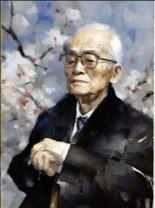Free-Religion Institute Classes
Why do we think interfaith dialogue is essential?
Study, Share, Learn, Practice, Act
The international Association for Religious Freedom is celebrating its 125th year of interfaith dialogue. We bring together more than 50 member organizations from almost all of the major world religious traditions.
* we know ourselves by knowing each other
* we share our knowledge and our traditions' wisdom with a liberal spirit of appreciating differences in perspective, culture, language, spiritual experiences
* we cooperate and collaborate to protect my minorities from injustice, intolerance and persecution
* we serve in a liberative, creative religious faith and practice for an enlightened and compassionate humanity
***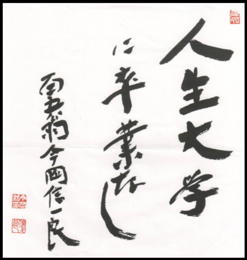
In the university of life there is no graduation. – Shin'ichirō Imaoka (1881-1988)
The Free-Religion Institute is dedicated to Shin'ichirō Imaoka and to the Free-Religionists who preceded him (Raja Rammohan Roy, Ralph Waldo Emerson, Albert Schweitzer, and so many more).
***
Free-Religion Institute Fall Classes
The September focus is on the EME Conference in Frankfurt, the online NAUA Summit, IARF Facebook, and the IARF Conference and Harmony Rally in India. More regional and local meeting for September will be listed as soon as they are received. And new Free-Religion classes will be announced as final plans are made.
September 24. Rev. Ming Po, a American Zen Buddhist priest will discuss Zen practice and the Middle Path.
The first session (Sept.24) will begin at 10am Denver (Mountain Time). Join Online
https://us06web.zoom.us/j/86943657920?pwd=l75aY3ys35rBDQ9UnbaNCWDfk8cihx.1
The passcode (if needed) is 043765.
The second/repeat session (Sept.24) will begin at 8pm Denver (Mountain Time) which is a new day in India and Japan –– Sept. 25th, 8:30am India and 12noon Japan. Join Online
https://us06web.zoom.us/j/86943657920?pwd=l75aY3ys35rBDQ9UnbaNCWDfk8cihx.1
Some Reading for those who wish: Cosmopolitan Zen Buddhist Precepts Primer
Rev. Ming Po will continue dual classes on the Middle Way at the same times relative to Denver on October 22nd and November 19th.
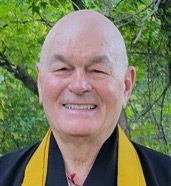
Rev. Ming Po
***
September 25, Rev. Michinori Maruta, a retired Rissho Kosei-kai minister, will continue teaching a course on Buddhism and the Middle Path. Date & Time: Last Thursday of every Month (JST, note day change).
1st Session JST 10:00 am (Japan, Sept. 25); ICT 8:00 am (Thailand, Sept. 25); PST 6:00 pm (Los Angeles); EST 9:00 pm (New York) 2nd Session JST 7:00 pm (Japan, Sept. 25); IST 3:30 pm (New Delhi, Sept. 25); BST 11:00 am (Britain, Sept. 25; CET 12:00 noon (Germany, Sept. 25)
Zoom URL for both sessions: https://us04web.zoom.us/j/8099882717 Passcode 195052 (if needed)
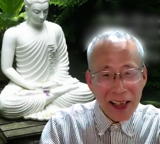
Rev. Michinori Maruta
***
Past Classes in July and August by the Rev. Andrew James Brown)
Free-Religion, Jiyū Shūkyō and Imaoka Shin'ichirō by Rev. Andrew James Brown
The courses on free-religion and Imaoka Shin’ichirō, founder of the modern Japanese free-religious movement, focused on one of IARF's exemplars and his vision of lifetime learning as a free religionist. Rev. Dr. Imaoka Shin’ichirō (1881-1988) was a twentieth-century Japanese educator, Yuniterian, and advocate of jiyū shūkyō (free religion).

Rev. Andrew James Brown
The July and early August videos of these sessions and the accompanying texts can be found at the following link:
<https://andrewjbrown.blogspot.com/2025/03/imaoka-shinichiro-1881-1988three.html>
August 19. Rev. Andrew James Brown presented his translation of Shin’ichirō Imaoka’s “The Position of a Free-Religion Person.” Reading.
Conservative, orthodox Christianity was transformed in Japan. Before the World Wars progress was known as Yuniterian. Progressives and radicals gathered at the headquarters of the American Unitarian Mission, Unity Hall. Some even thought Christianity should be the state religion. Video Link. Morning. Evening.
(Past Classes by Prof. George Williams)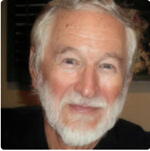
Prof. GeorgeWilliams
July 15. Introduction to the Vision and Task of the Free-Religion Institute.
Videos of Morning and Evening Sessions.
July 22. Vivekānanda's Gift of the Four Spiritual Paths
Because Svāmī Vivekānanda popularized the 4 spiritual practices (yogas) and paths (margas) in the West, we must thank him. Yet, IARF also must thank Raja Rammohan Roy, Shin’ichirō Imaoka, and Ralph Waldo Emerson. This class will honor their contribution as we see these Four Spiritual Paths uniting us in IARF.
Reading: Four Spiritual Paths. Video: Four Spiritual Paths.
July 29. Vivekānanda’s Dilemma: Spiritual or Religious Hierarchies and the Four Spiritual Paths
We continue exploring interfaith dialogue practices as we see that even the understanding obtained in studying the Four Spiritual Paths involves both dangers and misunderstandings. It can be imagined as the religious puzzle of the Ladder or the Wheel – discovering how we may privilege our own religious path.
Video: Vivekānanda' Dilemma.
August 5. Rammohan Roy and the Brahmo Samaj: Interfaith Dialogue and Social Action. Prof. George Williams
Few have had so many multiple religious influences in their early years--devotional Hindu mother, secular father, both Muslim and Vedic teachers, and that is just a start. Fewer have had the intellectual gifts and courage to rise above the tsunami that was transforming Mughal and British India. Same times. Video Link.
August 26. George Williams discussed “Imaoka Sensei, Interfaith Dialogue and Unconscious Pitfalls.”
Beginning with such promise, how could liberal, rational religion all but disappear as Yuniterian faith and practice? What lessons can be learned, if any lessons can be learned from an honest history?Video Link. Morning.
(Past Class by Rev. Abhi Janamanchi)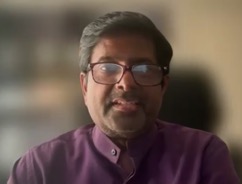
Rev. Abhi Janamanchi
August 12. Rev. Abhi Janamanchi spoke about the Brahmo Samaj, the Unitarian Union of the Khasi Hills, and the Chennai Unitarians. Reading.
The flame of liberal religion, often called the Hindu Renaissance, is flickering in the face of global nationalistic use of religion. Are liberative voices still being heard in India today? Video Link: Morning.
(Past Classes by Rev. Michinori Maruta)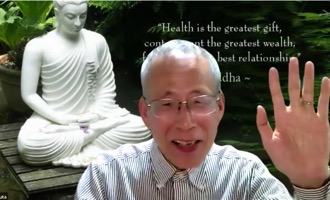
Theme: Dependent Co-arising (II) and Free Religion.
Rev. Maruta's classes on YouTube: (1) 2025/06/26 Dependent Co-arising and (2) 2025/07/24 Dependent Co-arising (Part 1)(Part 2)
August 28. Rev. Michinori Maruta will discuss "Buddhism and Free-Religion–Suffering and Free Religion". (Continuing on the last Thursday of each month)
Suffering—such as aging, sickness, death, and separation from those we love or the things we treasure—is universal. The Pali word for suffering is dukkha, which signifies unsatisfactoriness and stress. The Buddha Dharma teaches how dukkha arises and how it can be ended. The cessation of dukkha, called Nirvana, liberation and freedom, is feasible here and now. YouTube: August 27/28. 1st https://youtu.be/3NIWui66XPY;; and with Stephen Polmar, 2nd https://youtu.be/dx_4Pjd9O3A
***
Here are Some of the Tools Needed for Deeper Interfaith Dialogue
We are exploring the building blocks to discover free and liberative, liberal and inquiring, creative and compassionate religion?
So, what is there in the study of other religions that can be valuable for us? Huston Smith is credited with saying, “You can’t know your own religion without knowing another religion.” Father Thomas Merton, a Trappist monk in Gethsemane, Kentucky, said, “Learning about different religions enriches your faith in your own.” “Understanding other religions can deepen your understanding of your own.” “Exploring other religions is a path to deeper self-awareness in your own faith.”
Shin’ichiro Imaoka and the University of Life
“I do not believe that education itself ever truly ends. Education must continue throughout one’s life, even after one has moved on from being student to a working adult. That is to say, following school education, life education must take place. I refer to this school of life education as the University of Life (⼈⽣⼤学).”
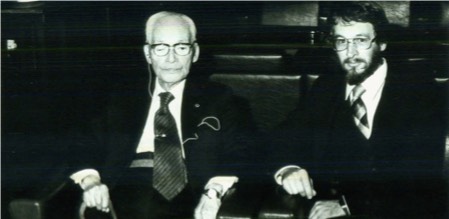
George Williams meeting with Dr. Imaoka in 1980 at the University of Tokyo Faculty Club.
It was Imaoka sensei who called us to explore religion for its liberating, creative essence found in all genuine religious and spiritual paths. He saw IARF’s unique role as the University of Life, a school of study and practice.
In IARF we come together because we wish to be compassionate and genuine human beings. We talk together and attempt to listen deeply to each other's successes and struggles. Each stage of life requires more knowledge as we develop in our particular faiths. We study together, share practices that keep us on a path toward the good, beautiful and true. May some of these topics tempt you to ask for a specific class. Enjoy and find the energy, strength and talent to become your spiritual ideal.
***
1 Interfaith Dialogue
This includes both powerpoint presentations and videos of talks given. IARF, as Imaoka Sensei has said, is not just about religious freedom, but about religion itself. As so many have said, one comes to know their own religion better by learning another. Learning to recognize other spiritual paths even in one’s own faith tradition is a beginning point. Learning specifics about another’s teachings, practices, and worship is another step. Celebrating and volunteering together begins to take IARF as part of our way of life.
A few of the teasers include:
• Talk at Ecumenical Conference: RC Conf G talk Oct 2023.mp4
* Text of Conference Talk: Jung's Accidental Contribution to Interfaith Dialogue
• 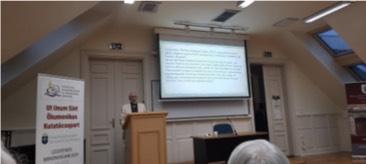
2 Basics for the Study of Religions
• Methods of Study: Introduction to the Study of Religion
• How an Historian of Religions studies Religion: Introduction to the study of Religion
3 Free-Religion, Jiyū Shūkyō, Sanātana Dharma
The courses on free-religion will centre on the work Raja Rammohan Roy, founder of the Brahmo Samaj (as a launching point for discussions of the Vedas, the Hindu Renaissance, Hindutva, etc.) and Imaoka Shin’ichirō, founder of the modern Japanese free-religious movement (as a launching point for discussions about Buddhism, Shintoism, Confucianism, and Buddhist-Christian relations etc.)
4 IARF History & Future
• Robert Traer, A Short History of IARF
• Richard Boeke Boeke - IARF A Personal History 2013
• Masuo Nezu, IARF East West
• Difficulties for IARF
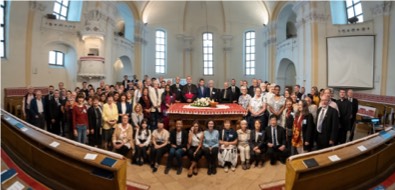
5 Liberal Religion and the Enlightenment
We already have courses underway by Rev. Andrew James Brown and Rev. Michinori Maruta.
• Liberal Religion
• Liberal Religion-Strengths Weakness
• Freedom, Free in many languages
• Freedom and the Enlightenment
• Questions about Freedom
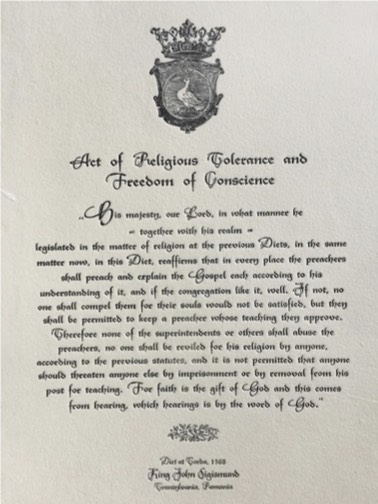
6 Raja Rammohan Roy and the Brahmo Samaj
• Rammohan Roy: Reexamining Sanatana Dharma
• The Sadharan Brahmo Samaj
7 Different Paths--Experientially, Cognitively, Spiritually
• Varieties of Religious Experience (from Appendix B, Cosmic Sage)
• 4 Types of Jung & 4 Spiritual Paths
• Each Types Strength & Weakness
• Mysticism as it appears in many religions
8 Religious Experience
• Perspectives on Religious Experience
• Peak Experiences and the Inexpressible
• Faith Series: This is a series of 10 powerpoint presentations that understand Faith, not as a set of beliefs or doctrines, but practices that involve study, learning, psychological and spiritual development, and that may even have stages of growth. (For example, Styles of Faith and Stages of Faith Development)
9 Existential Crises: Life's Struggles and Possibilities for Growth
Each faith attempts to heal suffering and the crises of life, often turning them into growth and deepened insights and personal truths. Perhaps it is fair to say that no organized religion to heal the 12 to 15 major crises of human existence. Thus,
interfaith dialogue about how one helps in particular crises can lead to greater awareness and compassionate care.
Some have argued that the raison d’etre of genuine religion is ministering to us as we go through life’s fundamental crises with their possibility for spiritual growth.
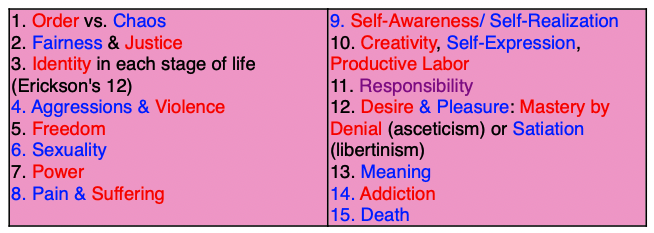
10 Faith as Development and Trust
• Faith Series: This is a series of 10 powerpoint presentations that understand Faith, not as a set of beliefs or doctrines, but practices that involve study, learning, psychological and spiritual development, and that may even have stages of growth. (For example, Styles of Faith and Stages of Faith Development)
• Styles of Faith; Stage Model of Faith; Fowler 6 Stages
• Erik Erikson developmental stages
• World Rels & Existential Crises
11 Basics for Study of Asian Religions.
• Religions of China
• Religions of Japan
• Religions of India
• Individual religions with an emphasis on visual learning
• Daoism
• Buddhism
• Confucianism
• Shinto, Kami no Michi
• Hindu traditions
• Islam
• Zoroastrian:
• Ahmadiyya:
• Baha’i

12 Basics for the Study of Western Religions
• Judaism
• Christianity
• Islam
• Pagan
13 Indigenous and Shamanic Religions
• Shamanic Mind. Shamanic Mind Presentation
• Dharma World on Hawaiian Religion
• Controversial Talk on Warrior Religions: Warrior Religion
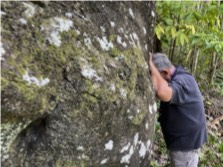
Prayers at a Healing Shrine
14 Miscellaneous Talks and Videos:
Buddhist Trinity & Christian Trinity
While comparative religion was exciting scholars of the 19th century, many saw Buddhism’s teaching of the Trikaya (the three bodies or essences of the Buddha) as the origin concept and the example for orthodox Christianity’s final
formulation of the Christian Trinity. This is a basic teaser from Theravada (southern) and Mahayana (northern) Buddhism’s perspectives. It also introduces the notion that beliefs may have come from direct religious experience in Buddhism, which in
this case can be demonstrated by the religious practices in Buddhism that lead to the experience of the Buddha in one or another of these kayas.
• Trikaya: Buddhism's Trinity
I gave this lecture (The Relative Inexperienceability of the Christian Trinity) at the National Institute for Advanced Studies in Bangalore, India, where the scientists there asked me to talk about the Christian Trinity. I decided to approach the topic from the perspective of the Phenomenology of Religion, which focuses on religious experience.
Only Jesus would have been able to do so, but he spoke Aramaic and Hebrew. There is a problem. How would you express such an experience in Aramaic and Hebrew?
• Christian Trinity
15 Talking with Our Authors
I have written a number of books that attempt to present the belief and practice of the member of a faith in its own integrity. Of course, it is an outsider’s view even though I try to present the best form of that faith that I am capable of understanding.
• Numerous works on Svami Vivekananda.
• Handbook of Hindu Mythology
• Shinto
• EasternPaths
• Cosmic Sage
• Hawaiian Faith and Practice: Kanenuiakea (written with Kumu Glen Kila). Uncle
Glen has promised to join on Zoom in the future.
• Shamans, Sages, and Saints
